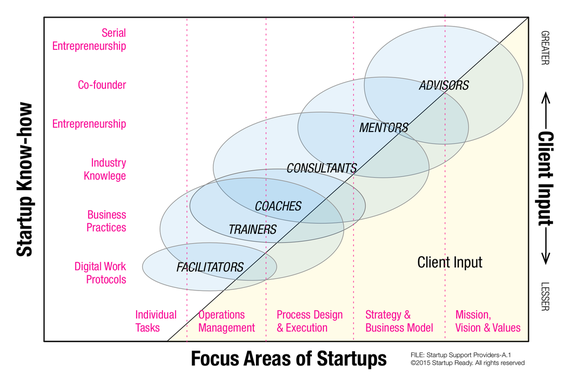
First-time entrepreneurs have concerns when looking to source support for their startups. This means there is usually a high degree of uncertainty. What kind of support when and for what purpose is a common problem. For instance, when does an entrepreneur look for a consultant, when does she source a coach, etc. More importantly what areas of the business is the support most appropriate for. For example, what kind of support provider is best for organising the business process. Would this be different to organising the Business Model or training staff?
Michael and I spent some time on clarifying the support entrepreneurs needed. At what point in their startup journey would they be looking for what kind of support. We also found we needed to look at this concern from the service provider's perspective as well. It can be frustrating for them when a client does not understand what their own needs are. The figure helps to break this down.
Here we used the Tannenbaum and Schmidt Continuum Theory as a base. The diagonal line highlights the importance of the knowledge base of the client. This rises the further up the value chain you go. For example, at the Investor/ Co founder level the client is expected to know best. Here the support provider can only provide guidance as an Advisor / Mentor. This ensures the entrepreneur's capacity for decision making is not crowded out. The trial and error is an essential part of the learning an entrepreneur goes through. The support provider can only help to lower its impact and not eliminate it.
The figure also highlights how complex the external support needs of entrepreneurs are. It breaks down the different kinds of support needed at the same time for differing purposes. For example, as a founder/ co founder of a high growth startup she has to work on investor relations. She has to organise the business model. Design processes, organise the operations and get things done all at the same time. The figure highlights three areas - Startup Knowledge levels. Startup Focus areas and, finally, the Client's Input while they experience the service. The startup knowledge level helps to break down the different knowledge areas. The startup focus areas help to break the differing areas the startup has to build and grow as it scales. The client input level helps to clarify how much input comes from the entrepreneur. It also helps clarify the contribution expected from the support provider.
A common problem tends to be clarity. This is when entrepreneurs think they are working on organising the operations. Yet, they are dealing with business model concerns. This matters because the focus and energy of the entrepreneur is being invested in area 'a'. Yet, the return is expected from area 'b'. This also matters because the kind of support needed is different. For instance, if the entrepreneur is dealing with investor level concerns. Then the most appropriate support would be seeking out an advisor / mentor. Who can help them develop the required know how for this specific concern. But, if the entrepreneur is looking to design their business processes. A consultant would be a better support provider because of their industry know how.
Professional support providers to entrepreneurs offer a hybrid support service. This allows them to service entrepreneur needs holistically. In other words, they will offer a mix of coaching, consulting, mentoring and advice. They will usually start the process by mapping out the current state of the business. This helps to clarify the needs of the business. It also helps to prioritise the concerns of the startup. For instance, the startup understands what the risks in the business are. Then the risk grading helps to prioritise which areas are focused on in what order. This then dictates where the focus and energy of the founder / co founder is directed.

I was recently catching up with Rekha Mehr. She highlighted she was now a director at MassChallenge UK. They were looking for business mentors. I offer this support as part of my CSR. So there was an obvious match. MassChallenge are a not for profit global startup accelerator. They organise a 4 month program for the startups they accept. They help their startups to access key resources needed to lower their risk of failure. Please remember 90% of funded startups fail. Organisations like MassChallenge are working to help lower this high rate failure rate.
Their mentoring matching sessions help entrepreneurs and business mentors interact. This helps both sides to understand what value the other party has to offer. In my case, I take a chaos based approach. This means anyone who feels like trying out my support can. After 2 or 3 sessions a natural self selection has occurred. This means both the entrepreneur and myself are under no obligation. Yet, we agree we need to work together because we feel there is something we can offer the other. In a voluntary role this usually means I see them flourish and develop. They get to lower their risk of failure.
The first formal session I have with the entrepreneur is to map their current state. This helps to clarify what the embedded risks and complexity is in the business at that moment in time. The next stage is to start at the Vision and Mission level. We then work our way down into the operational side of their projects. Part of the mapping process is help the entrepreneur understand how they can leverage the MassChallenge support. For instance, if funding is a key concern they can prepare for the final pitching competition. If they are fully funded then their focus is on developing the business.
The problem areas that emerge from the first session then become the focus areas for the rest of our time together. In the case of first time entrepreneurs. It does take some time to gain an accurate picture of what they are trying to achieve. This is because they are not used to articulating their thoughts and feelings about their projects. In the commercial world there is limited time and opportunity to focus on these kinds of soft concerns.
Another common concern among first time entrepreneurs is their mental models. Most tend to have built up their expertise as employees. So they are well versed in how to deliver a product/ service. Yet, the business owner level concerns tend to be new to them. I feel a protected space like an accelerator / incubator helps to give some time and space to nurture their mental models/ implicit frameworks. This necessarily lowers the high risk of failure that was seen as the nature of the beast till recently.
As an entrepreneur why don’t you start by breaking up your startup needs. You can then use the startup focus areas to make sure you are covering the total breadth of your concerns. This helps to ensure you have covered all the areas a high growth startups would normally need to cover.
Your current startup needs -
- -
- -
- -
- -
- -
- -
- -
- -
- -
- -
This exercise helps you to start nurturing your mental model as an entrepreneur. It will also help you nurture the complex mindset you need as an entrepreneur. You can start this process by consolidating the above concerns under the titles below. For example. Startups needs 9, 2, and 5 may be Execution level concerns. 4, 3 and 6 Investor / Co Founder level. 7 and 8 may be operational level and finally 1 and 10 Individual tasks level.
- Investors / Co founders
- Strategy / Business Model
- Process Design / Execution
- Operation Management
- Individual Task
Your support provider can then help ensure you gain clarity on all the concerns. This helps to ensure you have not missed anything. He/ she can then help you prioritise your risks. This will help give you some clarity in a chaotic and volatile environment.
Look forward to your thoughts and comments.
PS - Feel free post the results below. Always great to see how you do !

 RSS Feed
RSS Feed